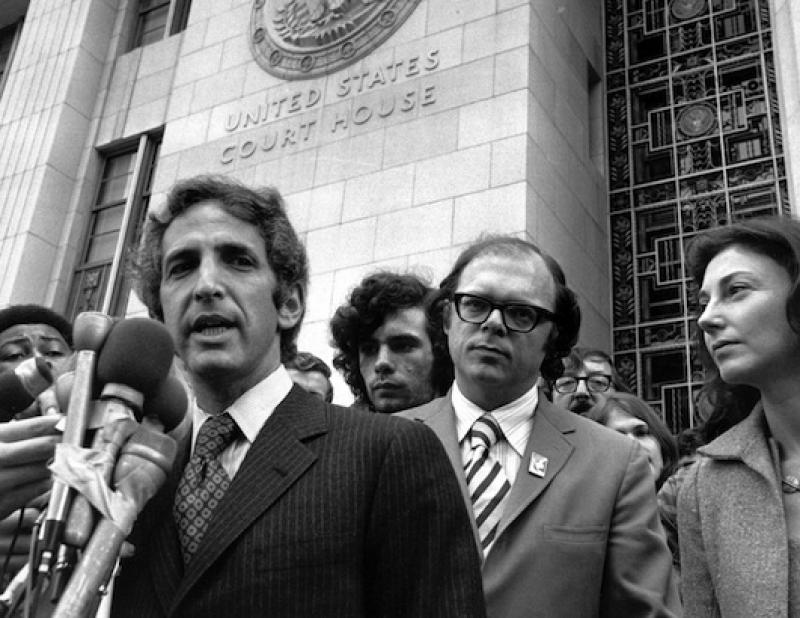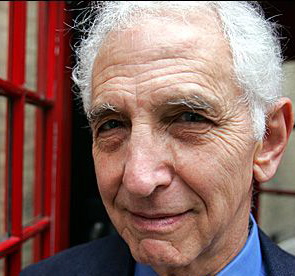Storyville: The Most Dangerous Man in America, BBC Four | reviews, news & interviews
Storyville: The Most Dangerous Man in America, BBC Four
Storyville: The Most Dangerous Man in America, BBC Four
Oscar-nominated documentary is as gripping as a Hollywood thriller

On Daniel Ellsberg's first day in his new job at the Pentagon in 1964, working under Secretary of Defence Robert McNamara, the Gulf of Tonkin incident occurred.
Judith Ehrlich and Rick Goldsmith's remorselessly gripping documentary operates on several levels. It's a history of the Vietnam war and a biography of Ellsberg, illustrated with newsreel film and hugely evocative black-and-white photographs, while exploring the relationship between citizens, government and the media. It's a political thriller, reminiscent of movies like All The President's Men or The Parallax View. The killer twist is the way it shows history repeating itself, with Ellsberg now a prominent protester against American involvement in Iraq, except that any prospect of a new Ellsberg bringing current administrations to book looks woefully improbable.
In 1971, the US Supreme Court established a First Amendment milestone by upholding the right of newspapers to publish top secret government documents. Result: the road to Watergate and the eventual collapse of the Nixon regime. But nothing similar has happened since, while the idea that the executive is answerable to the voters never caught on over here. The gaping flaws in our own "democracy" are amply illustrated by the Chilcot Inquiry, a kind of bloated therapy session for shifty politicians and their menials which aims vaguely to "identify lessons to be learned" about our involvement in Iraq.
Ellsberg is at front and centre of The Most Dangerous Man in America (as Henry Kissinger described him) as protagonist and interviewee, but as much as it depicts him as a heroic, crusading figure, it also makes some effort to calculate the cost of his actions. Ellsberg rather airily describes how he expected his leaking of the Pentagon Papers would damage the career of Harry Rowen, president of military think-tank the RAND corporation, but seems unconcerned by Rowen's subsequent sacking. It's left to other contemporaries to describe the sense of betrayal Ellsberg's actions provoked among his fellow workers in the intelligence community, who no doubt shared Nixon's assessment that Dan "gave aid and comfort to the enemy."
 But you'd need to be a special kind of individual to do what Ellsberg did, and most of us aren't capable of that kind of moral certainty and unswerving purpose. We might even find his imperious high-mindedness hard to take. But he wasn't short of physical courage either, and described his time as a company commander in the US Marines in the 1950s as one of the happiest periods of his life. In the Sixties he was a State Department adviser in Saigon for a couple of years, and vividly recalled being ambushed by the Viet Cong when he joined a combat patrol in the Mekong Delta to get a flavour of what US troops were up against. He rapidly concluded that "we couldn't beat this enemy in their own backyard. These guys were not going to give up."
But you'd need to be a special kind of individual to do what Ellsberg did, and most of us aren't capable of that kind of moral certainty and unswerving purpose. We might even find his imperious high-mindedness hard to take. But he wasn't short of physical courage either, and described his time as a company commander in the US Marines in the 1950s as one of the happiest periods of his life. In the Sixties he was a State Department adviser in Saigon for a couple of years, and vividly recalled being ambushed by the Viet Cong when he joined a combat patrol in the Mekong Delta to get a flavour of what US troops were up against. He rapidly concluded that "we couldn't beat this enemy in their own backyard. These guys were not going to give up."
When he subsequently gained access to "The Study", an encyclopedic super-secret history of American's involvement in Vietnam, it became clear to Ellsberg that the war he'd worked so diligently to support was indefensible. The documents revealed how Harry Truman had aided the French during the first Indo-China war, and how Eisenhower had given American backing to a brutal dictatorship in South Vietnam. Ellsberg concluded that the war "was a crime from the start," and when he came into contact with prominent anti-war activists such as Randy Kehler, he experienced a transformative moment in which, he explains, he felt that "my life had split in two." From that moment, he espoused the anti-war cause as zealously as he'd previously worked for the other side.
This isn't just Ellsberg's story. There were brave politicians like Mike Gravel and Pete McCloskey who stuck their necks out to oppose the mounting lunacy of Vietnam. It was a golden era for the American media too, with the New York Times leading the charge for freedom of information against the White House's paranoid authoritarianism. Walter Cronkite, doyen of American broadcasters, sensationally interviewed Ellsberg at a secret location when he'd gone into hiding to avoid arrest under the Espionage Act. This deservedly Oscar-nominated film brings those momentous events back to life, while prompting disturbing questions about whether those "lessons to be learned" about government secrecy and accountability have already been forgotten.
The future of Arts Journalism
You can stop theartsdesk.com closing!
We urgently need financing to survive. Our fundraising drive has thus far raised £49,000 but we need to reach £100,000 or we will be forced to close. Please contribute here: https://gofund.me/c3f6033d
And if you can forward this information to anyone who might assist, we’d be grateful.

Subscribe to theartsdesk.com
Thank you for continuing to read our work on theartsdesk.com. For unlimited access to every article in its entirety, including our archive of more than 15,000 pieces, we're asking for £5 per month or £40 per year. We feel it's a very good deal, and hope you do too.
To take a subscription now simply click here.
And if you're looking for that extra gift for a friend or family member, why not treat them to a theartsdesk.com gift subscription?
more TV
 Coldwater, ITV1 review - horror and black comedy in the Highlands
Superb cast lights up David Ireland's cunning thriller
Coldwater, ITV1 review - horror and black comedy in the Highlands
Superb cast lights up David Ireland's cunning thriller
 Blu-ray: The Sweeney - Series One
Influential and entertaining 1970s police drama, handsomely restored
Blu-ray: The Sweeney - Series One
Influential and entertaining 1970s police drama, handsomely restored
 I Fought the Law, ITVX review - how an 800-year-old law was challenged and changed
Sheridan Smith's raw performance dominates ITV's new docudrama about injustice
I Fought the Law, ITVX review - how an 800-year-old law was challenged and changed
Sheridan Smith's raw performance dominates ITV's new docudrama about injustice
 The Paper, Sky Max review - a spinoff of the US Office worth waiting 20 years for
Perfectly judged recycling of the original's key elements, with a star turn at its heart
The Paper, Sky Max review - a spinoff of the US Office worth waiting 20 years for
Perfectly judged recycling of the original's key elements, with a star turn at its heart
 The Guest, BBC One review - be careful what you wish for
A terrific Eve Myles stars in addictive Welsh mystery
The Guest, BBC One review - be careful what you wish for
A terrific Eve Myles stars in addictive Welsh mystery
 theartsdesk Q&A: Suranne Jones on 'Hostage', power pants and politics
The star and producer talks about taking on the role of Prime Minister, wearing high heels and living in the public eye
theartsdesk Q&A: Suranne Jones on 'Hostage', power pants and politics
The star and producer talks about taking on the role of Prime Minister, wearing high heels and living in the public eye
 King & Conqueror, BBC One review - not many kicks in 1066
Turgid medieval drama leaves viewers in the dark
King & Conqueror, BBC One review - not many kicks in 1066
Turgid medieval drama leaves viewers in the dark
 Hostage, Netflix review - entente not-too-cordiale
Suranne Jones and Julie Delpy cross swords in confused political drama
Hostage, Netflix review - entente not-too-cordiale
Suranne Jones and Julie Delpy cross swords in confused political drama
 In Flight, Channel 4 review - drugs, thugs and Bulgarian gangsters
Katherine Kelly's flight attendant is battling a sea of troubles
In Flight, Channel 4 review - drugs, thugs and Bulgarian gangsters
Katherine Kelly's flight attendant is battling a sea of troubles
 Alien: Earth, Disney+ review - was this interstellar journey really necessary?
Noah Hawley's lavish sci-fi series brings Ridley Scott's monster back home
Alien: Earth, Disney+ review - was this interstellar journey really necessary?
Noah Hawley's lavish sci-fi series brings Ridley Scott's monster back home
 The Count of Monte Cristo, U&Drama review - silly telly for the silly season
Umpteenth incarnation of the Alexandre Dumas novel is no better than it should be
The Count of Monte Cristo, U&Drama review - silly telly for the silly season
Umpteenth incarnation of the Alexandre Dumas novel is no better than it should be
 The Narrow Road to the Deep North, BBC One review - love, death and hell on the Burma railway
Richard Flanagan's prize-winning novel becomes a gruelling TV series
The Narrow Road to the Deep North, BBC One review - love, death and hell on the Burma railway
Richard Flanagan's prize-winning novel becomes a gruelling TV series

Add comment